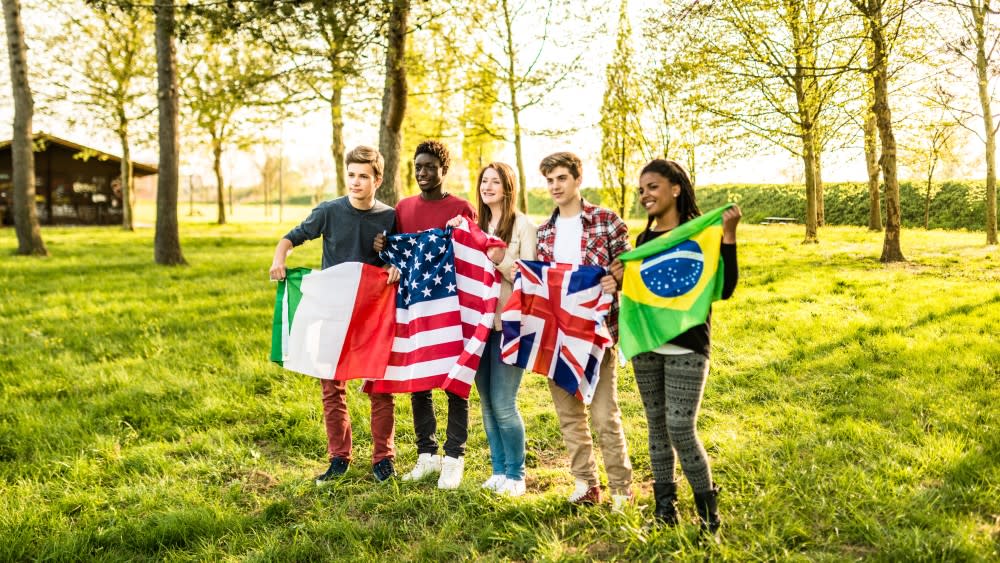What is respect? And how do we learn to communicate and problem-solve effectively across differences in a globalized world? The Global Citizenship Course (GCC) is a semester-long course that helps answer these questions, and challenges each student’s perspective on what diversity, equity, and inclusion really mean.
Being able to respectfully work with others from different cultural, socioeconomic, and linguistic backgrounds is a sought-after skill in today’s global world. In fact, Forbes claimed that being a global citizen will be the number-one requirement for business leaders in 2030.
So, what is a global citizen? According to Benjamin Laker at Forbes, “the mentality of the global citizen means thinking globally and embracing diversity. Leaders need to understand and appreciate new cultures, actively seek diverse teams, lead employees with different backgrounds, and [know how] to enter and succeed in new global markets.”
How can international students become global citizens? The Global Citizenship Course is a great place to start.
What Is the Global Citizenship Course?
The Global Citizenship Course (GCC) is a credit-bearing course open to international students enrolled at American Collegiate Live. Students who take the course build global leadership skills by reframing the way they interact with the world.
Back in 2016, the GCC was developed in partnership with the United Nations Educational, Scientific, and Cultural Organization (UNESCO). Participating students and educators could earn a Global Citizenship Course certificate after completing a range of interactive activities designed to challenge perspectives surrounding diversity and global competency.
“The course was designed from two basic theoretical frameworks,” says Rachel Quill, teaching and learning design manager, Shorelight Academic Affairs. “The first was a report called Educating for Global Competence … and what they identified as competencies were: investigate the world beyond your immediate environment; recognize perspectives, both your own and others; communicate ideas, particularly across difference; and take action to improve interactions globally.”
“The other foundational piece was UNESCO Global Citizenship Education Learning Objectives,” she continues. “These come in three buckets: cognitive, which also relates to critical thinking and analysis; socio-emotional, which helps people gain a feeling of belonging to and a responsibility for a common humanity … ; and behavioral, having to do with the willingness and motivation to take action to improve conditions around the world.”
During the GCC, students explore — through interactive and introspective activities — a wide range of topics including bias and prejudice, intercultural communication, tolerance and acceptance, sustainability, cultural self-awareness, gender and sexuality, human rights, and globalization.
Quill adds that the course is designed “around experiential learning. Every activity that we do encourages people to think about and experience something so they gain insights that they can then share in group discussions.”
The main objectives of the GCC are to teach students to:
Think critically and analytically
Empathize and respect differences
Recognize and identify the influence of their perspective
See how commonalities provide the basis for relationships
Understand the impact local issues may have on a global scale
Take action to create a more peaceful and tolerant world
International students who have completed the course understand how their new global perspectives will help them in the future, particularly with regard to global relations. They learn to see the world through another person’s “lens” and discuss how to bridge differences and work together to create a more unified world.
Milestones for the Global Citizenship Course
“We’ve run many workshops around the world since 2016, serving over 2,000 participants, which has resulted in a total of 3,500 GCC certificates,” says Scott Helfgott, vice president, Shorelight Academic Affairs. He adds, “We’ve run these workshops in 40 cities across 18 countries.”
Thanks to its impact upon future leaders of the world, the GCC was chosen as a finalist for the PIEoneer Progressive Education Delivery Award in 2019. It was also endorsed by the University for Peace in Costa Rica, an academic institution created by the United Nations. (This endorsement will appear on all future certificates.)
Helfgott says, “The global reach of the GCC has really been extensive and more and more expansive, of course, over the last 12 months. We’ve delivered these workshops through Zoom but hopefully we’ll get a chance to get back in-country and deliver them face-to-face as well.”
What to Expect from the Global Citizenship Course in the Future
The GCC is offered each semester as part of Career Accelerator Premier, which allows students to add the GCC certificate to their professional portfolio.
“Companies like Deloitte and Google are offering training opportunities around global competence, which really reinforces the idea of the GCC. It shows that it is something that is not just a ‘nice to have,’ but is something that will really set our students apart,” says Jason Rickey, Career Accelerator manager, Shorelight Academic Affairs.
Additionally, in the upcoming semester, the GCC will also expand the new Climate Change Scholarship it launched as part of American Collegiate Live for all students.
The GCC is vital to a student’s education. As the world becomes more hyper-connected, it is crucial to know how to communicate across differences and solve problems collaboratively. Students who learn the value of respect and are committed to diversity will have greater opportunities to succeed in the global arena.
Quill believes “the GCC is just a seed and the majority of what happens from the GCC happens outside of it, as participants notice new intercultural dynamics and apply their learning in unexpected moments to create positive change.” The GCC offers building blocks for a better future for everyone.
Shorelight can help you transition to campus life in the US >

